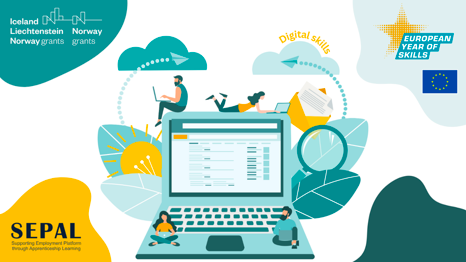More than two decades ago, little did we know how digital technologies were about to change our lives forever. Virtual posting, sharing, liking and commenting are the result of a continuously developing Web, which allows us to be close even from distance and transpose our feelings via online means. Today, thanks to all these functionalities, we are more connected than ever, both from a personal and professional point of view.
It is no surprise that in recent years, especially since COVID-19, digital and green transitions have been accelerated, stimulating even traditional companies to embark on a virtual path. The use of social media is maximizing year by year and as a consequence, users’ high consumption of Internet has become an open door for businesses to advertise their products and services online.
This phenomenon has led to an increased demand of professionals specialized in the digital field, which, according to Eurostat, consists of five areas: information and data literacy skills, communication and collaboration skills, digital content creation skills, safety skills and problem-solving skills. Having o adapt to a new labour environment, employees seem to face difficulties in acknowledging these new abilities. The 2021 Eurobarometer shows that about 1 in 4 citizens are worried about this issue, which could negatively impact some of their activities, such as working or studying online. With regard to the same topic, it has been discovered that 23% of people aged 15-24 years old are concerned about their capability to learn digital skills, and this percent increases by age, with 26% for those over 55.
Perhaps the most challenging skill is digital content creation, which requires social media managers to keep up with the latest trends and continuously innovate. In order to create engaging content, specialists need to become familiar with many tools and aspects: video and photo editing softwares, graphic design programs, display algorithms and digital media law. But once the content is created and ready to be published, an even extended level of knowledge has to be put into practice. SEO or Search Engine Optimization strategies are essential for you business, in order to return your services among the first search results. Advertising models and indicators such as PPC (pay-per-click) or PPV (pay-per-view) need to be measured to assess your succes, and e-mail marketing campaigns should be launched to spread the word about your products or services. At just one quick glance, the various areas of digital skills provide enough options to choose from.
However, many employees and recent graduates struggle to adapt to this new environment, as university programs in many European countries are not prepared themselves to train future professionals in this field. In 2021, statistics show that Romania (28%), Bulgaria (31%) and Poland (43%) were among the countries with the lowest share of people having at least basic digital skills, compared to The Netherlands and Finland (79%). Sill in 2021, researchers have discovered that only about 10,8% of EU citizens aged 25 to 64 had participated in education or training in the last 4 weeks, which may indicate a reluctance or fear to engage in new learning activities.
As a best practice example, until 2025, Microsoft and LinkedIn intend to help over 10 million people gain the necessary digital skills to fill in the new gap in the economic sector, by providing free access to over 350 courses and 50.000 learning scholarships. With the same intention, in the European Year of Skills, NGOs and institutions all around Europe have started to launch project ideas and access grants to fund digital skills learning activities, especially for people coming from vulnerable backgrounds.
At the end of the day, it also lays in one’s power and ambition to find the right opportunities to become better trained for a specific profession. In 2023, according to the European Commission’s view, there will be great investments in upskilling and reskilling, with focus on lifelong learning, relevance of the trainings to cover current needs and match people’s best abilities with suitable jobs and opportunities.
Resources:
- Microsoft
- Eurostat
- Digital Skills & Jobs Platform


